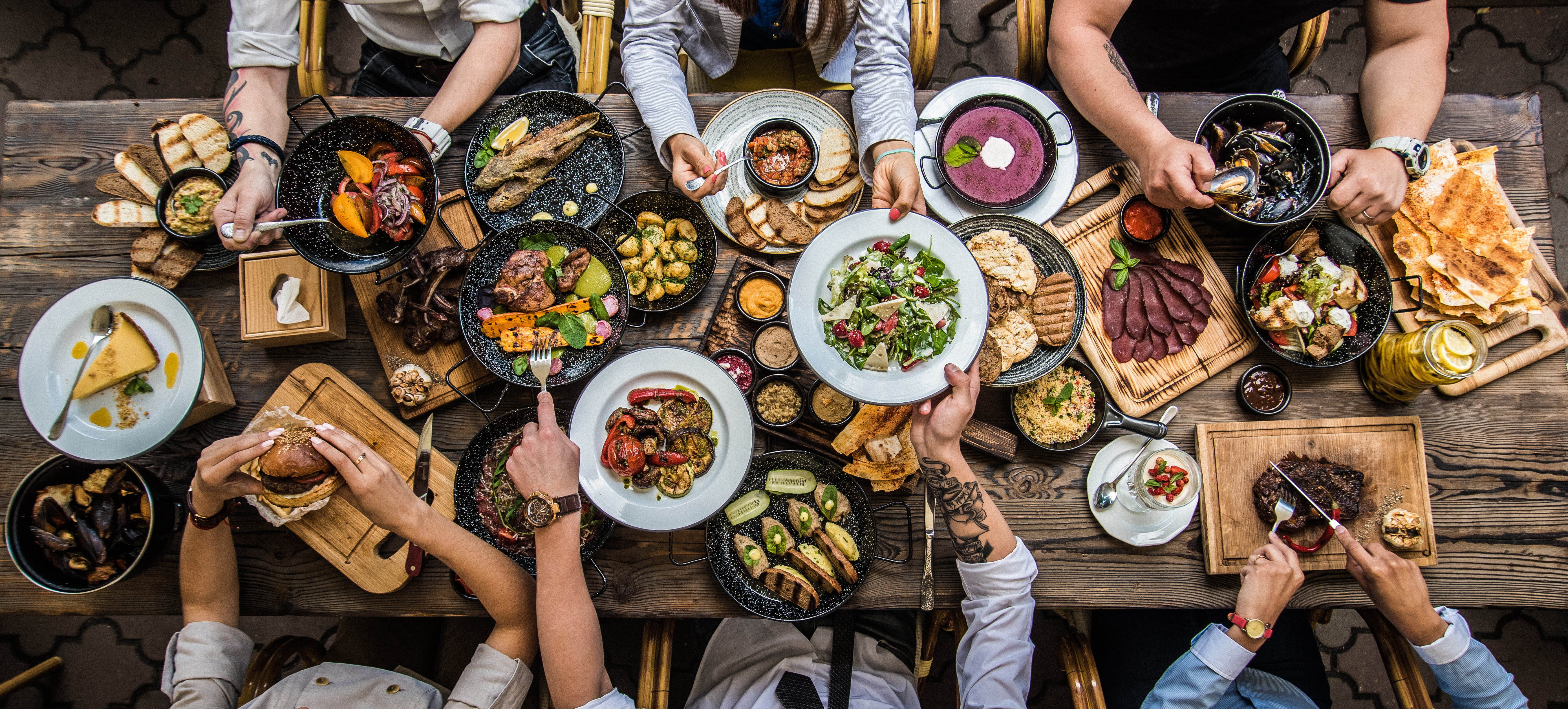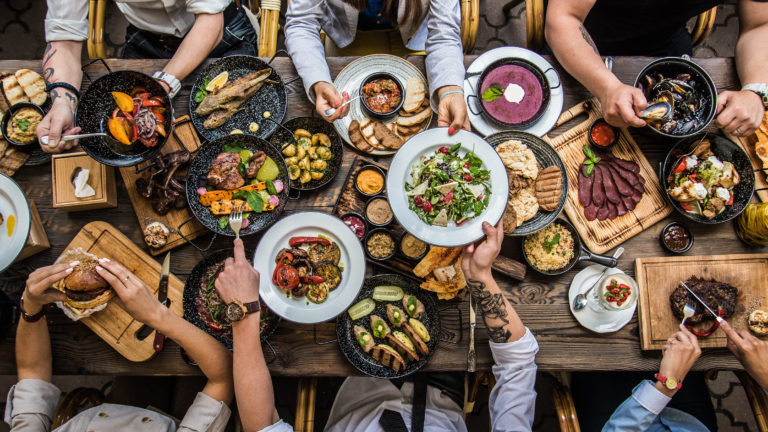
In the old days, people would go on diets to lose weight. People said it was about health, but it was usually about vanity. That’s fine. Then it really did become about health. Everyone I knew claimed to have some allergy to nuts, gluten, or lactose. These days, it seems like everyone has a highly curated diet, not just on grounds of preference and taste but rather tied to essential health needs, even some big spiritual philosophy, always with a big theory to back it.
Who can even throw a dinner party anymore? Really you can’t.
Who can even throw a dinner party anymore? Really you can’t.
This is why most house parties consist of finger food. People pick at things, carefully. One person eats the shrimp, not the toast. Another person eats the toast, not the shrimp. One person goes for the celery but not the peanut butter, while another person does the opposite. Some people won’t eat anything that grows underground, and others won’t touch anything that doesn’t.
You can’t even put honey on things without someone in the group asking whether this is the fake honey that might include corn syrup or the real thing, which is raw and made from local bees. Then someone will add: no, I won’t eat eggs from slave chickens, and wouldn’t you like to try my non-dairy cheese that I brought with me?
The situation is getting ever more extreme. Some diets have not only turned against all animal products but even against cooking. Talk to them and they will tell you that the invention of fire was the beginning of the end of human health. Cooking led to a holocaust of essential enzymes!
Special Needs Eaters
You have surely noticed the proliferation of stores catering to all these special needs. Each one reflects a lifestyle. This is happening at the same time that WalMart has driven down the price of what we used to call “groceries” down to the lowest possible level. Let’s face it: it’s all about class structure. We know who shops at WalMart (my store and I love it!), and we know who goes to The Fresh Market (where you listen to Schubert string quartets while you pay $20 for one piece of sustainable fish, whatever that is).
This whole trend is now deeply entrenched in American life. Amazon has purchased Whole Foods and has thereby deleted its long-running nickname Whole Paycheck. Now anyone in a major city can click the best of the best to be delivered to you personally within an hour. The $3 organic avocado has gone mainstream (only plebes like me refuse to pay more than $0.80).
Why, for goodness sake, are we incapable of celebrating the system that has given rise to these incomparably wonderful conditions? All this can be annoying. Let me rephrase this: this trend toward highly individuated diets used to drive me nuts. My thinking went this way. For 150,000 years, humankind struggled daily to get enough to eat. Getting food defined the very pulse of life. Other needs like shelter and clothing, once obtained, do not take up your waking hours. But food! You need it every day. Without refrigeration, everything spoils. You can preserve in salt, which accounts for why salt was still used as money as late as the early 19th century.
Getting food became easier with the capitalist revolution. But humanity didn’t fully realize the glory of having massive food variety until after World War II, when our homes got refrigerators and grocery stores had a reliable selection of all essentials.
But it wasn’t until very recently when we cared whether our cows are fed grass or corn, whether the chickens making our eggs live in cages or roam free, and whether our Brussel sprouts are raised on an industrial or organic farm.
Now I stand before the snack machine in the hotel lobby in awe. I can get any of this stuff for $0.75! Glory be to capitalism!
We Are All Spoiled
What incredible choice we have today. We are spoiled. I’ll admit to you that the snobbery this has bred has variously disgusted me. We can drive up to a window and throw down a buck or two for a burger with ingredients from all lands. Instead of cheering, we sneer at it all, condemning “frankenfood,” preservatives, and anything that dilutes our beef tacos with some slight addition of grain.
Where is our sense of history? Where is our appreciation of the plight of 99.999% of human history and human experience and how, through highly rarified conditions, we have somehow managed to escape it and instead are surrounded, everywhere, by a constant cornucopia of food delight? And why, for goodness sake, are we incapable of celebrating the system that has given rise to these incomparably wonderful conditions?
Own This
Do I need meditation strategies to return me to feeling at one with the universe? But you can only grumble so much. Here’s what I’ve come to realize. People only know the life they have. It matters not to anyone now that peasants in the 13th century slept on sacks of hay and husks crawling with bugs, had most children die in childbirth, had teeth pulled without anesthesia, rarely held actual money and couldn’t use it for anything if they did, and periodically faced down the black plague. They also ate rancid meat if and when it was available. Most of these people would have killed (literally) for a Big Mac.
That’s all interesting for the historian but it doesn’t matter now. We have passed through this stage of history and live in the age of one click, Uber Eats, and raw vegan meals on wheels for $7, brought to your table. These are our times, the only times in which we can actually live. So let’s make the best of it, right? Right.
I’m looking now at my Amazon Whole Foods interface, and see that I can get organic Arugula salad, fresh organic blueberries, and a quart of almond milk for $10. I can click now and see it at my doorstep in an hour. I’m trying not to be disgusted at how good we have it. I want to consume all this without guilt, without a nonstop awareness of how lucky we are, and maybe even join my friends in being upset when the delivery time stretches to 90 minutes. I want to embrace this new reality.
It also turns out that extreme curation might be more natural than the old way of a nationally mandated diet. What we eat does create biological desires. We feed them and that creates more. We force change and our bodies adapt. It makes sense, then, that the more varied our personal needs are, the more varied (and unique and strange) our dietary needs become.
It’s science!
I also need to work on curating my own personal diet, complete with a big life philosophy with some medical terms thrown in, and integrate that with a morning Yoga routine and some meditation strategies to return me to feeling at one with the universe.
All of this is possible. But I still don’t think I’ll ever get over my nostalgia for the dinner party. If you invite me to yours, I promise to eat everything you make, if only as an homage to the deprivations of days gone by.














Add comment